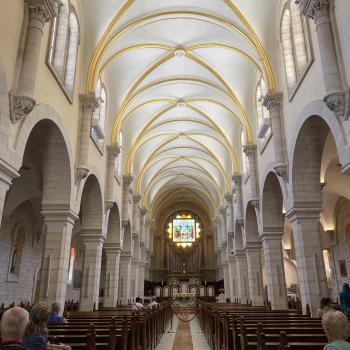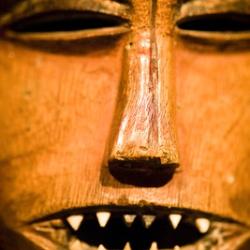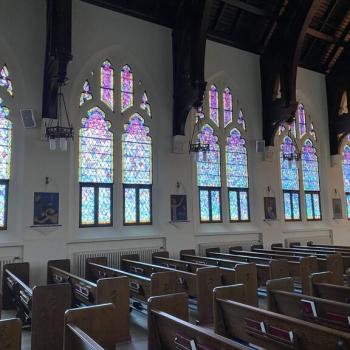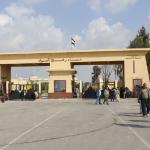On this day, the faithful who live in Christ dwell by the river Chebar.
They reside among the exiles, for they themselves suffer the same.
Yet like the prophet Ezekiel, God’s presence is made known among them;
He strengthens and guides them during their moment of disarray.

The Bible’s description of Israel’s Babylonian captivity provides not just a historical account of calamity experienced by God’s chosen nation, but it also contributes a fitting metaphor concerning the current condition of (what I believe to be) the One Holy Catholic and Apostolic Church.
In antiquity, the Israelites who survived the destruction of Jerusalem at the hands of the Chaldeans (as depicted in 2 Kings and elsewhere) were scattered to every wind; they were taken into exile in Babylon and no longer enjoyed the wholeness once experienced within the confines of Holy Jerusalem. Likewise, in modernity, the Church endures ongoing disunity; the three major Christian branches of Protestantism, Roman Catholicism, and Orthodoxy have been disconnected and dispersed by the East-West Schism of 1054, the Reformation, and other such ecclesiastical ruptures that have taken place throughout history. Because of Christian division and discord, believers combat one another even as they wage a much older battle, the timeless war against sin, worldliness, and the forces of darkness.
Dare We Hope That the Church Becomes One?
Concerning the exilic nature of contemporary Christianity, the controversial Lutheran mystic and theologian, Jacob Boehme once expressed his desire for a return; he declares: “Now I eagerly wish to see how one is to bring all these sects together into one, which would call itself the Christian Church, because all of them now are despisers and each group denounces the other and decries it as false”[i]
Within this statement there lies a weighty question. Assuming that a reunited Church is worthwhile and God-honoring, how on earth might this hope become a reality? A definitive answer to Boehme’s inquiry is beyond the scope of this editorial, but here are a few preliminary thoughts: for one, I am thoroughly convinced that it is indeed a righteous cause, yet I believe that if unity is to come, it must do so in difference; the unique theological convictions of orthodox Christian traditions must be preserved as believers of differing doctrines draw nearer to one another. In addition, I regard grassroots movements as essential to the enterprise. Local Christian communities should labor to achieve Church unity as well, not just national and international organizations (although, these are important too).
It is with this latter effort—the local Church’s call to interdenominational Christian communion—that the remainder of this article concerns itself; in what follows, I shall shift our present discussion to hone in on one particular local exercise that seems to be gathering fruitful momentum in a small town in Kentucky. (Be on the lookout for subsequent entries, where I continue to develop my thoughts regarding conservative ecumenism, fleshing out the captive Israel analogy in greater detail.)
The Church in Dialogue
The intention behind this introductory post is to embark upon a set of reflections concerning a project which began during the tumultuous year of 2020 at Cedar Grove Baptist Church in Shepherdsville, Kentucky. This event series, aptly entitled “The Church in Dialogue,” (TCID) seeks to do that which its name suggests, to bring together orthodox Christian denominations to thoughtfully discuss theological matters of common conviction and brotherly disagreement.
It is an ecumenical effort, but one that endeavors to facilitate Christian unity without doctrinal compromise. For this reason, each dialogue capitalizes on certain questions that assert the likeness of traditions, but also those which ascertain differing beliefs; difficult topics are not glossed over, but on the contrary, they are thoroughly examined to promote understanding amongst Christians and to perhaps even unearth hidden similarities that lie buried beneath theology’s dense surface.
The formal event is comprised of the following: an opening address, panel discussion, theological book giveaway, and the singing of popular hymns across denominations. TCID doesn’t just speak of Church unity, for it necessitates unity in action as all participants sing spiritual songs together as one body united in Christ Jesus. To further explain the goals and purposes for which this event series was founded (now eagerly awaiting its fifth installment), and as a way of concluding my first entry on the subject, I now direct the reader to a transcription of the opening address that was delivered at the inaugural Church in Dialogue event back in September of 2020:
To what end does this project seek to accomplish?
To answer such a question, in brief, I would assert that the objectives behind this evening’s proceedings are manifold. Firstly, It is my desire for “The Church in Dialogue” to contribute to the individual and collective theological literacy of all those who are in attendance. I firmly believe that by pulling back the veil of theological intricacies–especially those that are less than frequently expounded upon behind the pulpit– and discussing them, we are effectively improving our understanding of and adoration for that very denominational tradition in which we claim to be a part of.
Furthermore, because this is an event that includes the participation of multiple Christian denominations, we participants and observers are additionally working towards an improved awareness of the beliefs of those who are near to us, either geographically or perhaps in a manner of friendship or family. “Why is it that I attend a Baptist church while some of my dearest friends attend perhaps Catholic, Methodist, or Lutheran churches?” By the end of the night, I hope that we will be able to begin to answer such an inquiry. Truly, I feel that If we make an effort to familiarize ourselves with the thoughts, creeds, and practices of others, we will find more common ground and grow in compassion towards one another.
Secondly, it is my prayer that this event would capitalize on those aforementioned learned commonalities in such a manner so that we may if even for a moment, come together as a unified body. May we be one; even as the Father is in Christ and Christ in us, that we may also be in the triune God, so that the world may believe that the Father sent Christ into the world to save us from sin and death.[ii]
Tonight we will indeed learn about our differences, but also those aspects of the faith that knit us together. I request that this evening we would focus on the unifying tenets, the mere orthodox Christianity that is the pillar and cornerstone from which the various branches extend out and bear fruit. At the very heart of things, “a Christian… has no sect,” for “he has only a single knowledge and that is Christ in him…He puts all his knowing and willing into the life of Christ”[iii] and prays to the Almighty that God would help him to delight more in what he receives from Christ.
It must be said, however, that I am not insisting that the depths of Christian wisdom and theological content are without profound necessity. Far from it, what I am pleading is that we would not hoist those less-than-crucial philosophical and theological complexities over the blood of Christ, making them idols and placing them in front of the heart of the Gospel. May we determine to know nothing amongst ourselves except Jesus Christ and Him crucified?[iv]
In addition, I would like to make yet another disclaimer. The intention behind this event is not to proclaim that all beliefs and biblical conclusions regarding the nature of man, God, and creation are all correct or are on equal footing with one another. Instead, I would like to affirm that there is but a single ultimate truth and although we may view reality in differing manners, we orthodox Christians are in pursuit of that ultimate truth nonetheless and we should acknowledge that pursuit amongst our Christian brethren.
Finally, I would like to bring to light the ultimate reason for our gathering here tonight: to worship and glorify the Father, Son, and Holy Spirit with our whole and absolute being, for there is no comfort in anything apart from enjoying Him. He is the author and finisher of our faith and the whole work of redemption is His alone.
To learn more about The Church in Dialogue, including the contents of each of its installments, please continue to follow this reflection series.
Follow The Church in Dialogue on Facebook here
[i] Jacob Boehme, The Way to Christ (Mahwah: Paulist Press, 1978), 164
[ii] John 17:21
[iii] Boehme, The Way to Christ, 164
[iv] 1 Cor. 2:2












